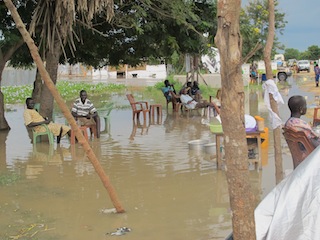WHO, partners respond to flood crises in two S. Sudan states
September 19, 2017 (JUBA) – The United Nations World Health Organization (WHO) in partnership with the Ministry of Health and partners are scaling up the emergency response in the flood affected areas of Aweil West and Aweil North Counties of former Norther Bahr el Ghazal State, and Maban County of former Upper Nile State.

The lifesaving health supplies will benefit 10 000 people living in areas deeply affected by the heavy rainfall in parts Northern Bahr el Ghazal and Upper Nile States of South Sudan for the next three months.
The supplies include 10 basic unit kits and 10 pneumonia kits for management of common illness. The supplies were deployed along with Medical Mobile Team (MMT) to support other health partners in management of common illnesses to reduce excess mortality and morbidity and build the capacity of partners in early case detection of outbreak prone diseases.
“Building the capacity of partners, increasing human resource and medical supplies are vital in such acute emergencies since it increases access to quality health care services to the affected population” said Evans Liyosi, the WHO Representative to South Sudan.
According to the State Ministry of Health, it is estimated that over 119 000 people have been affected due to flooding triggered by the heavy rainfall in 11 payams of Aweil North and Aweil West of former Northern Bahr el Ghazal State. More flooding also caused some deaths and injuries and has deeply affected the daily lives of over 650 households in eight villages of Bunj payam, Maban County, Upper Nile State.
The risk of water-borne disease in the wake of the floods is real; a cholera epidemic has already affected thousands of people, causing over 355 reported deaths,” said Allan Mpairwe, WHO Health Security and Emergency Officer.
“?We have to act very fast to avoid the spread of water-borne diseases and the transmission of vector-borne diseases such as malaria,” he added.
The floods have also destroyed roads, schools, homes, crops and vegetables all over the affected areas. This means the situation will get worse, with more people needing temporary housing and urgent humanitarian help.
WHO, Liyosi said, will continue to strengthen its humanitarian support in coordination with the Ministry of Health and partners to save the lives of the vulnerable community.
(ST)
